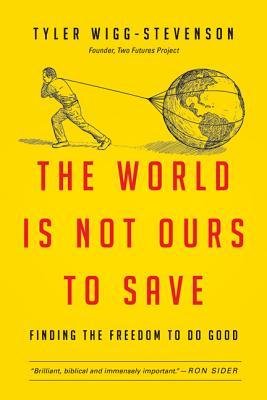The World Is Not Ours to Save
There’s been a recurring theme on this blog early in 2013. In my very positive review of Ken Wytsma’s Pursuing Justice, I put forward a gentle critique of the optimistic way he talks about “changing the world.” Soon afterwards, I offered some thoughts on James Davison Hunter’s sobering assertion that Christians would do well to practice “faithful presence” rather than thinking that changing the world is particularly within grasp. Then, in the pages of a book on faith and learning by Cornelius Plantinga, Jr., I thought I found a sort of middle ground.
Then along came the timely and much discussed book by Tyler Wigg-Stevenson, The World Is Not Ours to Save: Finding the Freedom to Do Good (IVP). Wigg-Stevenson leads the Two Futures Project, an evangelical movement aimed at abolishing nuclear weapons. If there ever was a “world-changing” undertaking, this is it. Yet Wigg-Stevenson, a dedicated activist, wants to tell us that the world is not ours to change, or at least it’s not ours to save. And he insists this is good news.
It’s good news because God is the one saving the world. If, like the man in the book cover illustration, we feel that the weight of the world is on our shoulders, we won’t last very long. The task is simply too burdensome. Rather, for those of us who confess that Jesus is Lord and that he is making all things new, we experience a freedom and a hope unattainable to activists who insist on carrying the weight themselves.
We can do good without demanding that our good works immediately usher in the kingdom. We relinquish the control and, to a certain extent, the results. In exchange we get to participate in a mission whose ultimate outcome is sure.
Wigg-Stevenson tells a bit of his personal story, including how he got involved in anti-nuclear activism and lessons he’s learned along the way. He winsomely weaves reflections on scripture together with his own experiences around the world, from naked peace marches in San Francisco (note: the author remained fully clothed) to heartbreaking experiences in the Holy Land.
For a guy whose life mission is abolishing nuclear weapons, the book sure doesn’t read like a PR piece for a particular cause. Rather, it seems Wigg-Stevenson – who does have a Master of Divinity degree – is sincerely intent on offering a bit of pastoral care for a younger generation still hyped up on its inflated chances of saving the world. That hype will inevitably waver and the vision will surely fade. And when it does, young activists will find in this book a treasure trove of good news. Will they listen before their lives depend on it? I hope so.
I received a free copy of this book from the publisher in exchange for my honest thoughts.
